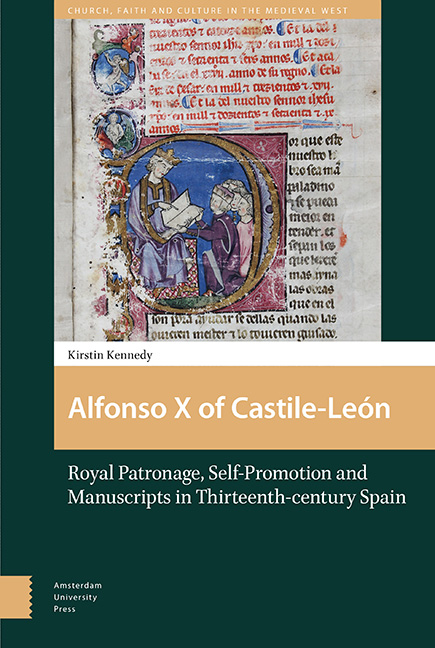 Alfonso X of Castile-León
Alfonso X of Castile-León Book contents
- Frontmatter
- Dedication
- Contents
- Acknowledgements
- List of Figures
- Abbreviations
- Introduction: ‘the king Makes a Book’
- 1 Alfonso X, his Literary Patronage, and the Verdict of Historians
- 2 Alfonso in his Texts: literary Models and Royal Authorship
- 3 Reality, Politics, and Precedent in Images of Alfonso
- 4 Codices Laid Out for a King : the Appearance and Production of Alfonsine Manuscripts
- 5 The Circulation of Alfonsine Texts: Astrological Works and Chronicles
- Concluding Remarks
- Manuscript Sources
- Index
- Frontmatter
- Dedication
- Contents
- Acknowledgements
- List of Figures
- Abbreviations
- Introduction: ‘the king Makes a Book’
- 1 Alfonso X, his Literary Patronage, and the Verdict of Historians
- 2 Alfonso in his Texts: literary Models and Royal Authorship
- 3 Reality, Politics, and Precedent in Images of Alfonso
- 4 Codices Laid Out for a King : the Appearance and Production of Alfonsine Manuscripts
- 5 The Circulation of Alfonsine Texts: Astrological Works and Chronicles
- Concluding Remarks
- Manuscript Sources
- Index
Summary
Alfonso X had a long, eventful, and violent reign. His repeated and ultimately unsuccessful attempts to become Romano-German emperor placed a heavy burden on his finances, while his attempts to use taxation and legislation to strengthen and centralize royal power at the expense of the Castilian and Leonese magnates provoked them to protest, temporary self-imposed exile, and open hostility. So, too, did his sporadic attempts to toy with established customs in relation to the royal succession. He had contemplated the possibility in some versions of his legal codes that the children of his eldest son and heir, Fernando, rather than his own second son, Sancho, should inherit the throne in the event of Fernando's death. In 1275 Fernando died unexpectedly, leaving a French widow, Blanche, and two young children, Alfonso and Fernando, the Infantes de la Cerda. This provoked a succession crisis which gave a hostile French king, Philip III, the right to argue that the crown of Castile should pass to the Infantes de la Cerda and through them to France, and a disaffected Castilian and Leonese nobility the opportunity to turn Sancho into a leader who would represent their cause against his father. Against this backdrop of political turbulence, Alfonso had to secure and repopulate the territories conquered by his father from the Muslim rulers of al-Andalus decades earlier, reassert his authority in the kingdom of Murcia after an uprising there in 1264, and ward off attacks and the threat of invasion from the king of Granada and from Marinid invaders based in North Africa.
These internal and external challenges to his throne would alone have been sufficient to ensure that Alfonso retained the interest of later historians, but assessments of his reign are also influenced by the brilliant court he maintained and the literary activity he encouraged there. Gil de Zamora described how ‘counts, marquises, princes and magnates, soldiers and townsmen’ from across the world flocked to him ‘in order to breathe in the sweet scent of his universal renown’, and to find ‘a refuge from enemies, advice against doubt and a generous and unlocked treasure-house against penury and poverty’
- Type
- Chapter
- Information
- Alfonso X of Castile-LeónRoyal Patronage, Self-Promotion and Manuscripts in Thirteenth-century Spain, pp. 215 - 220Publisher: Amsterdam University PressPrint publication year: 2019


